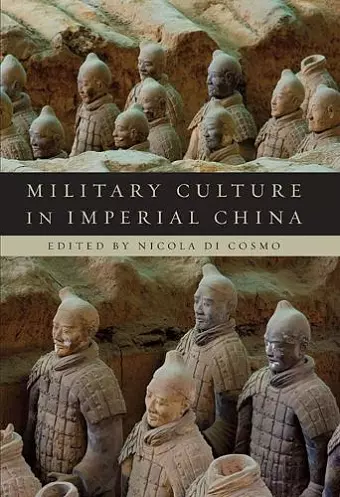Military Culture in Imperial China
Format:Paperback
Publisher:Harvard University Press
Published:3rd Apr '11
Currently unavailable, and unfortunately no date known when it will be back

This is a very valuable contribution to Chinese history and to the growing field of comparative military history. It corrects the common view that China was a society of civil culture, to the exclusion of the military. The authors address the Chinese treatment of the culture of war in the Chinese context, not as a subset of European military culture; they move beyond works that tend to disparage China for not waging war in a European way. As contemporary China emerges as a major military power, this book is important and timely. -- Diana Lary, University of British Columbia Military Culture in Imperial China asks basic questions and answers them brilliantly. It is not about battles, but about how Chinese culture represented and in turn shaped the military and warfare. In case studies from the span of Chinese history, we finally learn how organized violence formed and reflected religious ideas and practices, traditions of historical writing, politics, literature, and economics. This book is a must for anyone interested in China's imperial history and in military history more generally. -- Hans van de Ven, University of Cambridge
These original essays explore the relationship between culture and the military in Chinese society from early China to the Qing empire, with contributions by eminent scholars aiming to reexamine the relationship between military matters and law, government, historiography, art, philosophy, literature, and politics.
This volume explores the relationship between culture and the military in Chinese society from early China to the Qing empire, with contributions by eminent scholars aiming to reexamine the relationship between military matters and law, government, historiography, art, philosophy, literature, and politics.
The book critically investigates the perception that, due to the influence of Confucianism, Chinese culture has systematically devalued military matters. There was nothing inherently pacifist about the Chinese governments’ views of war, and pragmatic approaches—even aggressive and expansionist projects—often prevailed.
Though it has changed in form, a military elite has existed in China from the beginning of its history, and military service included a large proportion of the population at any given time. Popular literature praised the martial ethos of fighting men. Civil officials attended constantly to military matters on the administrative and financial ends. The seven military classics produced in antiquity continued to be read even into the modern period.
These original essays explore the ways in which intellectual, civilian, and literary elements helped shape the nature of military institutions, theory, and the culture of war. This important contribution bridges two literatures, military and cultural, that seldom appear together in the study of China, and deepens our understanding of war and society in Chinese history.
This is a very valuable contribution to Chinese history and to the growing field of comparative military history. It corrects the common view that China was a society of civil culture, to the exclusion of the military. The authors address the Chinese treatment of the culture of war in the Chinese context, not as a subset of European military culture; they move beyond works that tend to disparage China for not waging war in a European way. As contemporary China emerges as a major military power, this book is important and timely. -- Diana Lary, University of British Columbia
Military Culture in Imperial China asks basic questions and answers them brilliantly. It is not about battles, but about how Chinese culture represented and in turn shaped the military and warfare. In case studies from the span of Chinese history, we finally learn how organized violence formed and reflected religious ideas and practices, traditions of historical writing, politics, literature, and economics. This book is a must for anyone interested in China's imperial history and in military history more generally. -- Hans van de Ven, University of Cambridge
This excellent book will be the starting place for many future scholars of Chinese military history. -- K. E. Stapleton * Choice *
This is an extremely valuable study of Chinese military culture. -- Peter Lorge * Bulletin of the School of Oriental and African Studies *
Future students of the role of the military in Chinese history will want to have the present volume close at hand. -- Paul Jakov Smith * Journal of Military History *
Throughout Military Culture in Imperial China, it is clear China did not have the dramatic split between military and literary culture that many have perceived...As China grows economically, politically and militarily, it will become increasingly important to understand China's present military culture, which is rooted in the imperial tradition explored in this book. -- Francesco Sisci * Asia Times *
ISBN: 9780674060722
Dimensions: unknown
Weight: unknown
456 pages